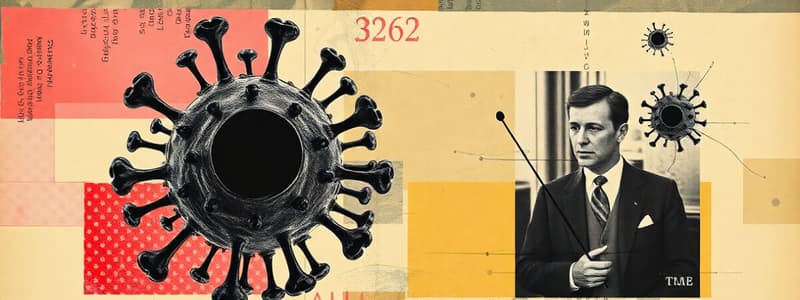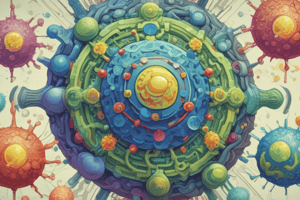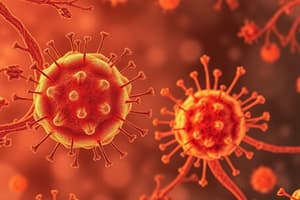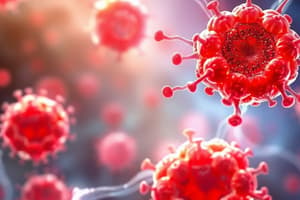Podcast
Questions and Answers
Which class of antibody primarily indicates a primary immune response?
Which class of antibody primarily indicates a primary immune response?
- IgG
- IgM (correct)
- IgA
- IgE
What is the primary function of Helper T cells?
What is the primary function of Helper T cells?
- Recognize and capture antigens
- Help produce antibodies and regulate the immune response (correct)
- Directly kill infected cells
- Activate complement proteins
Which type of vaccine is designed to provide immunity through the use of live, weakened microbes?
Which type of vaccine is designed to provide immunity through the use of live, weakened microbes?
- Live, attenuated vaccines (correct)
- Toxoid vaccines
- Subunit vaccines
- Inactivated vaccines
What type of immunity is achieved when the body produces its own antibodies in response to infection?
What type of immunity is achieved when the body produces its own antibodies in response to infection?
Which class of antibody is most abundant in circulation and can cross the placenta?
Which class of antibody is most abundant in circulation and can cross the placenta?
Which of the following antibody classes is primarily involved in allergic reactions?
Which of the following antibody classes is primarily involved in allergic reactions?
What is the main characteristic of subunit vaccines?
What is the main characteristic of subunit vaccines?
Which type of T cell is primarily responsible for stimulating macrophages to destroy bacteria?
Which type of T cell is primarily responsible for stimulating macrophages to destroy bacteria?
What is considered an example of artificial passive immunity?
What is considered an example of artificial passive immunity?
Which antibody class has 10 binding sites and is associated with the first immune response?
Which antibody class has 10 binding sites and is associated with the first immune response?
What is the primary response in adaptive immunity?
What is the primary response in adaptive immunity?
Which antibody is first produced during a primary immune response?
Which antibody is first produced during a primary immune response?
What is the main difference between humoral and cellular immunity?
What is the main difference between humoral and cellular immunity?
What is clonal selection in adaptive immunity?
What is clonal selection in adaptive immunity?
What is the primary function of effector cells?
What is the primary function of effector cells?
Which region of an antibody binds to antigens?
Which region of an antibody binds to antigens?
What do memory cells do in adaptive immunity?
What do memory cells do in adaptive immunity?
What is the structure of an antibody composed of?
What is the structure of an antibody composed of?
What is the function of the Fc region in antibodies?
What is the function of the Fc region in antibodies?
What do B cells primarily target in the body?
What do B cells primarily target in the body?
Flashcards
Adaptive Immunity's Primary Response
Adaptive Immunity's Primary Response
Adaptive immunity's primary response involves a faster, stronger, and larger concentration of antibodies, indicating a more effective immune reaction.
First Antibody Produced
First Antibody Produced
IgM is the first antibody produced during the initial encounter with a pathogen.
Humoral vs. Cellular Immunity
Humoral vs. Cellular Immunity
Humoral immunity relies on B cells to produce antibodies targeting extracellular pathogens, while cellular immunity involves T cells directly eliminating infected or abnormal cells.
B Cells Target
B Cells Target
B cells specialize in targeting extracellular pathogens, which are located outside of cells.
Signup and view all the flashcards
T Cells Role
T Cells Role
T cells play a crucial role in cellular immunity by directly eliminating infected or abnormal cells.
Signup and view all the flashcards
Epitopes
Epitopes
Epitopes are specific regions on antigens that are recognized by B and T cells, triggering an immune response.
Signup and view all the flashcards
Clonal Selection
Clonal Selection
Clonal selection in adaptive immunity refers to the activation of B and T cells that are specifically tailored to recognize a particular antigen.
Signup and view all the flashcards
Effector Cells
Effector Cells
Effector cells are specialized immune cells that actively target and eliminate pathogens, playing a direct role in fighting off infections.
Signup and view all the flashcards
Memory Cells
Memory Cells
Memory cells are a type of immune cell that 'remember' previous encounters with pathogens, enabling a faster and stronger immune response upon re-exposure.
Signup and view all the flashcards
Antibody Structure
Antibody Structure
An antibody is composed of two heavy chains and two light chains, linked together to form a Y-shaped structure.
Signup and view all the flashcards
IgM
IgM
First antibody produced in the immune response. It is short-lived and has 10 binding sites.
Signup and view all the flashcards
IgG
IgG
Most abundant antibody in circulation. It crosses the placenta, providing passive immunity to the fetus.
Signup and view all the flashcards
IgA
IgA
The antibody responsible for mucosal immunity in the respiratory and gastrointestinal tracts, found in saliva, tears, and gastric fluids.
Signup and view all the flashcards
IgE
IgE
Plays a key role in allergic reactions. It triggers mast cell degranulation, releasing histamine and other inflammatory mediators.
Signup and view all the flashcards
IgD
IgD
Acts as a receptor on the surface of B cells. Its function is not fully understood, but it may be involved in B cell activation.
Signup and view all the flashcards
Cytotoxic T Cells (CTLs)
Cytotoxic T Cells (CTLs)
Eliminates infected or tumor cells. They are able to recognize specific antigen-MHC complexes on target cells.
Signup and view all the flashcards
Helper T Cells (TH cells)
Helper T Cells (TH cells)
Regulate the immune response, helping to produce antibodies.
Signup and view all the flashcards
TH1 Helper T Cells
TH1 Helper T Cells
Stimulates macrophages to destroy bacteria. They play a key role in cellular immunity against intracellular pathogens.
Signup and view all the flashcards
TH2 Helper T Cells
TH2 Helper T Cells
Promotes humoral immunity by aiding B cells to produce antibodies. Crucial for antibody production and fighting extracellular pathogens.
Signup and view all the flashcards
Immune Memory
Immune Memory
Refers to the immune system's ability to 'remember' pathogens. This means that a second exposure to the same pathogen will elicit a faster and stronger response.
Signup and view all the flashcardsStudy Notes
Adaptive Immunity
- Primary response: Occurs during first exposure to a pathogen; lower antibody concentration. IgM is produced first, followed by IgG.
- Secondary response: Faster, stronger, and higher antibody concentration. Primarily involves IgG production.
- Humoral immunity: Antibody-mediated; involves B cells targeting extracellular pathogens.
- Cellular immunity: Cell-mediated; involves T cells targeting infected or abnormal cells.
Lymphocytes
- B cells: Remain in bone marrow; produce antibodies targeting extracellular pathogens.
- T cells: Pass through thymus; involved in cellular immunity, targeting infected or abnormal cells.
- Epitopes: Regions on antigens recognised by immune cells (B and T cells).
- Clonal selection: Process activating B and T cells specific to an antigen leading to effector and memory cells.
Antibodies
- Structure: Two heavy chains and two light chains.
- Fab region: Antigen-binding site; highly variable.
- Fc region: Facilitates binding to phagocytes and complement system.
- IgM: First antibody produced during primary response; 10 binding sites. Indicates initial immune response.
- IgG: Most abundant, crosses placenta; provides long-term immunity.
- IgA: Mucosal immunity; found in bodily fluids (e.g., saliva, tears).
- IgE: Involved in allergic reactions.
- IgD: B cell receptor.
T Lymphocytes
- Helper T cells (TH): Regulate immune responses, including antibody production.
- TH1: Stimulates macrophages to destroy bacteria.
- TH2: Promotes humoral immunity by aiding B cells.
- Cytotoxic T cells (CTLs): Eliminate infected or tumor cells.
Vaccines
- Live attenuated vaccines: Weakened microbes for strong immune response.
- Inactivated vaccines: Killed pathogens; require boosters for long-term immunity.
- Subunit vaccines: Antigen fragments; cannot cause disease.
- Toxoid vaccines: Inactivated toxins; require boosters.
- Conjugate vaccines: Combine weak antigens with stronger ones to improve immune response.
Immunity
- Active immunity: Body produces its own antibodies.
- Natural: Infection.
- Artificial: Vaccination (e.g., injection of weakened, dead virus).
- Passive immunity: Body receives antibodies from another source.
- Natural: Maternal antibodies (placenta or breast milk).
- Artificial: Injection of antibodies.
Studying That Suits You
Use AI to generate personalized quizzes and flashcards to suit your learning preferences.




